Devin The Dude / “What A Job”
A couple weeks ago, I said hip-hop was all about beats and rhymes. Kalamu responded, in part, that I may walk the walk, but I don’t talk the talk. Meaning, over the last couple years, the hip-hop that I’ve actually posted hasn’t been representative of what I called “the essence of hip-hop” or “beats and rhymes.” While I can see how and why Kalamu would believe that, I think his conclusion is based on a misunderstanding of what I mean by “beats and rhymes” and how that ethos is presented in hip-hop music. The two artists Kalamu specifically mentioned as being not representative of my definition of hip-hop were A Tribe Called Quest and Digable Planets. The irony is, the albums I wrote about from those groups—ATCQ’s Instictive Travels and Digable Planets’ Blowout Comb—are two of the most rhythm-focused albums in the history of the music. Neither album ever had a chance to cross over to the mainstream pop audience precisely because they are too beat-oriented. If you think about it, the two albums have a quite similar drum sound: muted, very thick and full, syncopated, highly repetitive. And the MCs, as well, are very rhythmic. There’s virtually none of the sing-song-ish MCing you’ll hear a lot of if you turn on the radio today. It’s dense lyricism — straight MCing. So if all of this is true, why are these albums seen as something other (or something ‘more’…whatever that’s supposed to mean) than hardcore hip-hop? I think it’s because both groups also excel at using jazzy and/or soulful samples to augment their beats and rhymes. The rhythms may be the bones, the structure, the essence of both ATCQ and the DPs, but the jazzy hooks are what a lot of people remember (particularly more casual fans of hip-hop). To understand what I mean, listen to some DPs or ATCQ and instead of listening to the song as a whole, focus in on just those jazzy samples. What you’ll hear are loops, and often, those loops will last only a few seconds each. The melodies are never developed. Contrast that with the way the rhythms are treated. Every syllable uttered by the MCs are like a counter-rhythm that interacts with the main drum track. And those drum tracks are always very upfront and forceful. They are impossible to miss. They are the essence of the music. I could make similar points about just about every hip-hop group I’ve ever posted. M.C. Lyte, the Roots, Public Enemy, Grandmaster Flash, Boogie Down Productions, etc. I've talked about all of these artists on BoL, and all of them are highly focused on beats and rhymes. (And this goes double for Public Enemy! P.E. is probably the most complex and serious rhythm-focused group in the history of electronic-based music. I’m amazed that Kalamu could hear P.E.’s music as being about something other than beats and rhymes. When it comes to beats and rhymes, P.E. (re)wrote the book.) If you look back at the hip-hop artists Kalamu’s posted vs. the ones I’ve posted, the biggest difference you’ll see is that Kalamu tends to post music from artists with one foot in hip-hop (usually vocally) and the other foot in a different style of music. Meaning, the hip-hop artists Kalamu usually posts feature musical accompaniment that is focused more on melody and harmony than rhythm. Either that, or the artists use vocal styles that are closer to spoken word or singing than actual MCing. Note that I’m not saying there’s anything wrong with these types of artists. It’s just not usually to my taste, because when it comes to hip-hop, I like mine straight with no chaser. You can probably see this divide more clearly if you think about some of the jazz tracks I’ve posted. I enjoy jazz, but I’m certainly no jazzhead. I dig stuff like Lonnie Liston Smith, Bobbi Humphrey and Lou Donaldson just as much as I dig ‘Trane or Miles. To a hardcore jazz fan, that’s sacrilege. Intellectually, I can understand that swing and improvisation (two things that Lonnie, Bobbi and Lou don’t do much of) are essential to jazz, but I don’t feel the importance, the centrality, of it. If I hear a catchy jazz tune that barely swings and has only basic improvisation, I may well like it anyway while Kalamu will almost certainly dislike it. In the same way, I almost never dig a hip-hop track that doesn’t have either hard beats, hard rhymes or both.
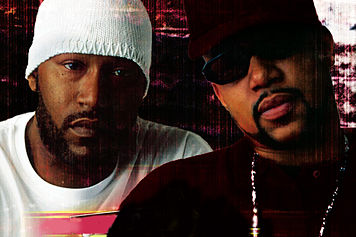 UGK – “The Game Belongs To Me” from UGK: Underground Kingz (Jive - 2007)
UGK has been around since before God made dirt. In fact, to hear Bun B and Pimp C tell it, they’re probably the ones who helped God spread that dirt all over Port Arthur, Texas, which, in case you were wondering, is the “P.A.T.” they’re always referring to. Since 1987 and until the day they finally hang up their mics, Bun and C have had only one subject and that’s street hustling. What’s kept me listening all these years is Pimp C’s hilariously over-the-top Texas drawl and Bun B’s dark molasses flow. They’re also two very funny individuals – check the chorus. (If you need help: ‘Bobby’ is weed, ‘Whitney’ is crack and ‘Screw’ is codeine syrup.)
UGK – “The Game Belongs To Me” from UGK: Underground Kingz (Jive - 2007)
UGK has been around since before God made dirt. In fact, to hear Bun B and Pimp C tell it, they’re probably the ones who helped God spread that dirt all over Port Arthur, Texas, which, in case you were wondering, is the “P.A.T.” they’re always referring to. Since 1987 and until the day they finally hang up their mics, Bun and C have had only one subject and that’s street hustling. What’s kept me listening all these years is Pimp C’s hilariously over-the-top Texas drawl and Bun B’s dark molasses flow. They’re also two very funny individuals – check the chorus. (If you need help: ‘Bobby’ is weed, ‘Whitney’ is crack and ‘Screw’ is codeine syrup.)
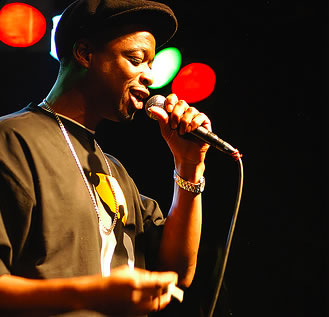 Devin The Dude feat. Snoop Dogg & Andre 3000 – “What A Job” from Waitin’ To Inhale (Rap-A-Lot - 2007)
Devin is a cat out of Houston who’s been operating just outside of the mainstream for more than a decade. Aside from his obsession with weed, Devin is virtually the opposite of Pimp C and Bun B. They’re big, loud and brash. He’s terminally laidback and self-avowedly ‘average.’ This track — in which Devin breaks down the behind-the-scenes mechanics of rap non-superstardom — is a good example of Devin’s style. It’s also notable for containing one of the most touching verses I’ve heard in a long time. It’s guest rapper Andre 3000 explaining why he raps not for fortune or fame but for “that boy who graduated” and “his baby mama Kee-Kee.” I’m feeling that.
Devin The Dude feat. Snoop Dogg & Andre 3000 – “What A Job” from Waitin’ To Inhale (Rap-A-Lot - 2007)
Devin is a cat out of Houston who’s been operating just outside of the mainstream for more than a decade. Aside from his obsession with weed, Devin is virtually the opposite of Pimp C and Bun B. They’re big, loud and brash. He’s terminally laidback and self-avowedly ‘average.’ This track — in which Devin breaks down the behind-the-scenes mechanics of rap non-superstardom — is a good example of Devin’s style. It’s also notable for containing one of the most touching verses I’ve heard in a long time. It’s guest rapper Andre 3000 explaining why he raps not for fortune or fame but for “that boy who graduated” and “his baby mama Kee-Kee.” I’m feeling that.
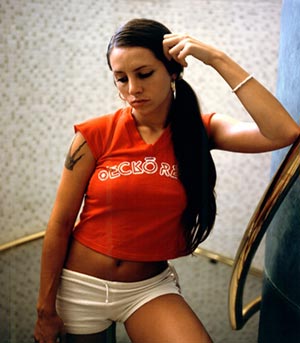 La Mala Rodríguez - "Lo Fácil Cae Ligero" from Alevosia (Universal Latino - 2003)
After all my talk about how I only like it hardcore, here’s a crossover track that I can’t get enough. This young lady is an MC from Spain with a very interesting background. Her vocal technique is interesting too, mixing the lazy-tongued style of a T.I. or 50 Cent with something that reminds me of the stop-and-start feel of Ladybug from the Digable Planets. The track sounds like something Dr. Dre might’ve done back in 1990, including the wah-wah guitar, which was probably recorded live. (Dre used to do a lot of that too.) Of course, I haven’t a clue as to what La Mala (which means, ‘The Bad Girl,” I think) is rapping about, but that hasn’t stopped me from listening to this song something like eleventy-billion times.
La Mala Rodríguez - "Lo Fácil Cae Ligero" from Alevosia (Universal Latino - 2003)
After all my talk about how I only like it hardcore, here’s a crossover track that I can’t get enough. This young lady is an MC from Spain with a very interesting background. Her vocal technique is interesting too, mixing the lazy-tongued style of a T.I. or 50 Cent with something that reminds me of the stop-and-start feel of Ladybug from the Digable Planets. The track sounds like something Dr. Dre might’ve done back in 1990, including the wah-wah guitar, which was probably recorded live. (Dre used to do a lot of that too.) Of course, I haven’t a clue as to what La Mala (which means, ‘The Bad Girl,” I think) is rapping about, but that hasn’t stopped me from listening to this song something like eleventy-billion times.
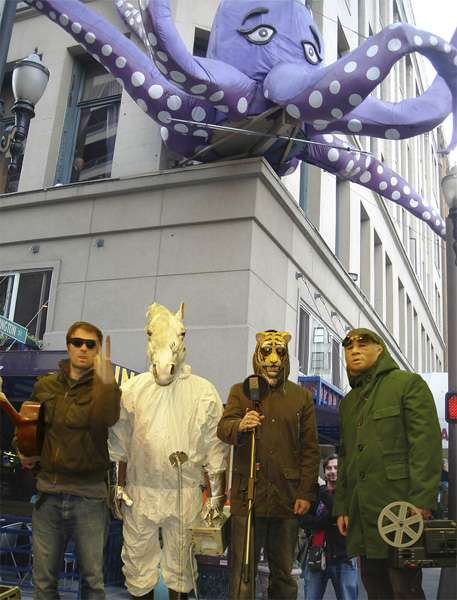 Tolcha feat. Rider Shafique and RQM – “Rising Tides” from Gestalt (Meta Polyp - 2006).
I know virtually nothing about these cats except that the production crew is from Berlin and the MCs are from the UK and Germany, respectively, but I dig their track because of how they’re mixing two of my favorite styles of beat-driven music: reggae dub and hip-hop MCing. Usually, mixes like this compromise one or the other element. Either it’s a good dub with weak MCing, or it’s real MCing over a fake-sounding dub. In this case, the dub is good enough to stand on its own, and the MCing, while not great, is good enough to hold its own with those pulsing bass drops. Like one of the MCs says, “I got this need to speak over drums.” I hear that.
Tolcha feat. Rider Shafique and RQM – “Rising Tides” from Gestalt (Meta Polyp - 2006).
I know virtually nothing about these cats except that the production crew is from Berlin and the MCs are from the UK and Germany, respectively, but I dig their track because of how they’re mixing two of my favorite styles of beat-driven music: reggae dub and hip-hop MCing. Usually, mixes like this compromise one or the other element. Either it’s a good dub with weak MCing, or it’s real MCing over a fake-sounding dub. In this case, the dub is good enough to stand on its own, and the MCing, while not great, is good enough to hold its own with those pulsing bass drops. Like one of the MCs says, “I got this need to speak over drums.” I hear that.
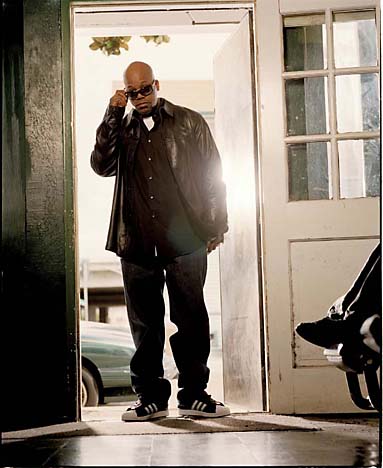 Too Short – “Blow The Whistle” from Blow The Whistle (Jive - 2006).
After sixteen albums, I find it amazing that Too Short is still around. At one time in the late Eighties and early Nineties, I picked up every new Too Short album the moment it dropped. I won’t lie and say there’s any reason to still do that now, but on occasion, Short does still come up with something worth hearing. Like Bun B, Short excels at locking into the groove and just keeping it there. His flow never changes and he never gets complicated, but for Too Short fans like me, listening to him is like going back home. Comfortable.
Too Short – “Blow The Whistle” from Blow The Whistle (Jive - 2006).
After sixteen albums, I find it amazing that Too Short is still around. At one time in the late Eighties and early Nineties, I picked up every new Too Short album the moment it dropped. I won’t lie and say there’s any reason to still do that now, but on occasion, Short does still come up with something worth hearing. Like Bun B, Short excels at locking into the groove and just keeping it there. His flow never changes and he never gets complicated, but for Too Short fans like me, listening to him is like going back home. Comfortable.
 M.C. Lyte – “The Wonder Years” from Promo Only (2006)
My girl, Lyte. The original hard-rhyming female MC. Before her (and truthfully, after her as well), most women who rapped didn’t attempt to compete directly with male MCs. But Lyte never backed down from anyone. Over the years, Lyte’s style has mellowed a lot. She’s not the young firebrand she was twenty years ago, but then, who is? What she’s lost in intensity, she’s gained in maturity, dropping lines like, “Some of us need to be doing a bid / Spitting lyrics that’s worse than Ritalin for kids.” Speak on it, Lyte. … And yes, folks, Premier is on the break.
—Mtume ya Salaam
I have a theory
Back in the day there was a big, big, ugly, vicious split within the Black Panther Party between founder Huey Newton and the charismatic Minister of Information, Eldridge Cleaver. Cleaver was a strong advocate of the lumpen proletariat—the street folk, the under-employed and unemployed, folks who survived on the hustle.
What the lumpen had in spades was “heart” and “soul.” They had no desire whatsoever to conform to mainstream values. Sort of a permanent opposition to the status quo. And they had the courage and cojones to live their convictions. Plus, there was an unquenchable get-it-while-(& when)-you-can approach to life.
In a similar way, our popular music bumps with the hardest joy of any music in the world today. Regardless of the overt message, there is an interior message of enjoying life—it's in the beat. The hard hooks. The hummable melodies or the witty phrases you can't help repeating.
That's the upside. The downside is amorality, violence and a cold-hearted all-for-me/fuck-everybody-else attitude.
A lot of what passes for keeping it real today is really keeping it lumpen. Hence, the ascendancy of what has been called gangsta rap and bling, bling. My theory is that the lumpen mentality is actually nothing but street level capitalism, hence all the emphasis on getting paid, getting laid, getting, getting… consumerism at its most primal, pleasure principle level.
The lumpen hierarchy is simple: the powerful on top, the strong just below, and everybody else underfoot. A major corollary to the lumpen hierarchy is an embrace of patriarchal power and privilege, which necessarily includes the demeaning and dominating of women.
All of this operates within a dominate system that is capitalist to the core and sexist through and through. In effect, the street merely reflects the larger society.
That’s where I think a lot of popular rap is coming from. Although I’m no Christian, the Bible has pointedly pinpointed one of the major questions facing us today: what does it profit to gain the world and lose our souls?
The main message of popular culture (and I don’t just mean rap) is that profit is more important than principles or, more accurately, profit is the highest principle.
The Honorable Elijah Muhammad famously preached that we are what we eat. I believe that’s true not just on the physical level but also on the cultural level… I’m sure you can see where this viewpoint is headed.
Mtume, I believe some of the music you’ve selected for the contemporary category has minimal nutritional value. One of the arguments I frequently hear in response to my position is that everything doesn’t have to be politically correct, can’t it just be fun.
Is fun by definition backward and “incorrect”? I don’t think so. I think you can have fun without advocating fucking over (profiting off) others. The problem is that we are at a social crisis crossroads. The quality of life in general is diminished and/or deformed. We turn to consumerism to satiate our hungry souls but “things” can’t and don’t replace the nourishment of positive social relationships.
These songs exemplify lumpen strengths and weaknesses. But you know what—and here is where the issue gets really, really complex. I prefer to struggle with the lumpen than join the status quo.
I am against censorship and against the majority of the self-serving capitalist laws on the books today used to legalize and justify our continued exploitation and oppression. At the same time I know that no society can continue to exist without laws or social norms to regulate behavior and one of the main functions of culture is to teach and reinforce social beliefs and behavior.
What may simply seem like entertainment, i.e. "fun," is actually an advocacy of specific viewpoints. For example, running all through the selected contemporary songs is an emphasis on marijuana use (whether as a product to sell or a drug to consume). I believe marijuana ought to be decriminalized. I believe America is one big drug culture and drug dependency and abuse ought to be directly addressed at the consumer level. Freddy’s dead. Getting high is a crutch to enable the individual to put up with modern life and does little to encourage individuals to get together and change the negative conditions.
What I would like to see is music that consciously opposes the status quo and not simply revels in outlaw behavior and living large-ism.
I think MC Lyte is obviously headed in a direction I dig but she’s no longer at the epicenter of rap culture. Nor for that matter is Lupe Fiasco a major mover, but he is a young rapper on the rise and I believe his work ought to be encouraged.
M.C. Lyte – “The Wonder Years” from Promo Only (2006)
My girl, Lyte. The original hard-rhyming female MC. Before her (and truthfully, after her as well), most women who rapped didn’t attempt to compete directly with male MCs. But Lyte never backed down from anyone. Over the years, Lyte’s style has mellowed a lot. She’s not the young firebrand she was twenty years ago, but then, who is? What she’s lost in intensity, she’s gained in maturity, dropping lines like, “Some of us need to be doing a bid / Spitting lyrics that’s worse than Ritalin for kids.” Speak on it, Lyte. … And yes, folks, Premier is on the break.
—Mtume ya Salaam
I have a theory
Back in the day there was a big, big, ugly, vicious split within the Black Panther Party between founder Huey Newton and the charismatic Minister of Information, Eldridge Cleaver. Cleaver was a strong advocate of the lumpen proletariat—the street folk, the under-employed and unemployed, folks who survived on the hustle.
What the lumpen had in spades was “heart” and “soul.” They had no desire whatsoever to conform to mainstream values. Sort of a permanent opposition to the status quo. And they had the courage and cojones to live their convictions. Plus, there was an unquenchable get-it-while-(& when)-you-can approach to life.
In a similar way, our popular music bumps with the hardest joy of any music in the world today. Regardless of the overt message, there is an interior message of enjoying life—it's in the beat. The hard hooks. The hummable melodies or the witty phrases you can't help repeating.
That's the upside. The downside is amorality, violence and a cold-hearted all-for-me/fuck-everybody-else attitude.
A lot of what passes for keeping it real today is really keeping it lumpen. Hence, the ascendancy of what has been called gangsta rap and bling, bling. My theory is that the lumpen mentality is actually nothing but street level capitalism, hence all the emphasis on getting paid, getting laid, getting, getting… consumerism at its most primal, pleasure principle level.
The lumpen hierarchy is simple: the powerful on top, the strong just below, and everybody else underfoot. A major corollary to the lumpen hierarchy is an embrace of patriarchal power and privilege, which necessarily includes the demeaning and dominating of women.
All of this operates within a dominate system that is capitalist to the core and sexist through and through. In effect, the street merely reflects the larger society.
That’s where I think a lot of popular rap is coming from. Although I’m no Christian, the Bible has pointedly pinpointed one of the major questions facing us today: what does it profit to gain the world and lose our souls?
The main message of popular culture (and I don’t just mean rap) is that profit is more important than principles or, more accurately, profit is the highest principle.
The Honorable Elijah Muhammad famously preached that we are what we eat. I believe that’s true not just on the physical level but also on the cultural level… I’m sure you can see where this viewpoint is headed.
Mtume, I believe some of the music you’ve selected for the contemporary category has minimal nutritional value. One of the arguments I frequently hear in response to my position is that everything doesn’t have to be politically correct, can’t it just be fun.
Is fun by definition backward and “incorrect”? I don’t think so. I think you can have fun without advocating fucking over (profiting off) others. The problem is that we are at a social crisis crossroads. The quality of life in general is diminished and/or deformed. We turn to consumerism to satiate our hungry souls but “things” can’t and don’t replace the nourishment of positive social relationships.
These songs exemplify lumpen strengths and weaknesses. But you know what—and here is where the issue gets really, really complex. I prefer to struggle with the lumpen than join the status quo.
I am against censorship and against the majority of the self-serving capitalist laws on the books today used to legalize and justify our continued exploitation and oppression. At the same time I know that no society can continue to exist without laws or social norms to regulate behavior and one of the main functions of culture is to teach and reinforce social beliefs and behavior.
What may simply seem like entertainment, i.e. "fun," is actually an advocacy of specific viewpoints. For example, running all through the selected contemporary songs is an emphasis on marijuana use (whether as a product to sell or a drug to consume). I believe marijuana ought to be decriminalized. I believe America is one big drug culture and drug dependency and abuse ought to be directly addressed at the consumer level. Freddy’s dead. Getting high is a crutch to enable the individual to put up with modern life and does little to encourage individuals to get together and change the negative conditions.
What I would like to see is music that consciously opposes the status quo and not simply revels in outlaw behavior and living large-ism.
I think MC Lyte is obviously headed in a direction I dig but she’s no longer at the epicenter of rap culture. Nor for that matter is Lupe Fiasco a major mover, but he is a young rapper on the rise and I believe his work ought to be encouraged.
 Lupe Fiasco’s “Coulda Been” is a track I like a lot. He catalogues life possibilities for most of today’s lumpen and working class youth. It’s an unsentimental portrait that even includes beautiful references to suicide and to mental illness, not that either condition is beautiful in itself but the way Lupe describes the situations is extremely artful. No, "Coulda Been" is not overtly revolutionary, but in this era it's a strong, leftward blowing wind that pushes us to think critically about who we are and what our conditions are.
Mtume, I think you are wrong in thinking that the early rap was just about having fun. It was about having fun in spite of and despite everyday oppression and exploitation, despite miseducation and no education, despite the lack of social services such as cultural centers and youth programs, despite war (Vietnam) and despite economic hard times.
One of the hallmarks of black culture is that we have always found a way to squeeze drops of joy out of tons of sorrow. Not only have we sung in a strange land, we have made the world join in our song. I think we just need to be clear about the strengths (and weaknesses) of our musical culture and our people.
After all we don’t have to be who this society shapes us to be. We can be something else, something beautiful, something upful, full of life, righteous and wonderful. If we are willing to fight for it, we could be healthy and happy human beings. Our popular music can advocate change, urge us to keep on keeping on, to move on up a little higher. Historically, that's just what our music has done and that’s the kind of popular music we need today.
—Kalamu ya Salaam
Lupe Fiasco’s “Coulda Been” is a track I like a lot. He catalogues life possibilities for most of today’s lumpen and working class youth. It’s an unsentimental portrait that even includes beautiful references to suicide and to mental illness, not that either condition is beautiful in itself but the way Lupe describes the situations is extremely artful. No, "Coulda Been" is not overtly revolutionary, but in this era it's a strong, leftward blowing wind that pushes us to think critically about who we are and what our conditions are.
Mtume, I think you are wrong in thinking that the early rap was just about having fun. It was about having fun in spite of and despite everyday oppression and exploitation, despite miseducation and no education, despite the lack of social services such as cultural centers and youth programs, despite war (Vietnam) and despite economic hard times.
One of the hallmarks of black culture is that we have always found a way to squeeze drops of joy out of tons of sorrow. Not only have we sung in a strange land, we have made the world join in our song. I think we just need to be clear about the strengths (and weaknesses) of our musical culture and our people.
After all we don’t have to be who this society shapes us to be. We can be something else, something beautiful, something upful, full of life, righteous and wonderful. If we are willing to fight for it, we could be healthy and happy human beings. Our popular music can advocate change, urge us to keep on keeping on, to move on up a little higher. Historically, that's just what our music has done and that’s the kind of popular music we need today.
—Kalamu ya Salaam
This entry was posted on Sunday, August 12th, 2007 at 12:07 am and is filed under Contemporary. You can follow any responses to this entry through the RSS 2.0 feed. You can leave a response, or trackback from your own site.
2 Responses to “Devin The Dude / “What A Job””
August 12th, 2007 at 2:37 pm
right on brothers. Very inspiring discourse and I agree we don’t have to be what the system wants us to be. like Marley said:We refuse to be what they want us to be”. love
August 12th, 2007 at 5:52 pm
Aahhhhhhh yes, Devin the Dude! Stumbled on this track a few weeks ago and am loving it, although I am far less anamored with Snoop these days than I used to be. Andre Benjamin is a stone-cold musical phenomenon and I’m bound to love just about anything he does. Thanks for including that track this week, and for including hip-hop…period.
Leave a Reply
| top |